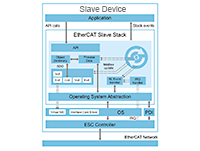KPA EtherCAT Slave Stack
KPA EtherCAT Slave stack is a software stack designed to run on microcontrollers, CPUs, DSPs, FPGAs with or without any operating system. It is provided as a source code or a compiled library.
Meets EtherCAT standards
KPA EtherCAT Slave Stack supports all features defined in the EtherCAT standards. Each new version is verified with the latest released and all internal versions of the EtherCAT Conformance Test Tool (CTT), as koenig-pa GmbH is a member of the Technical Working Group Conformance.
Optimized memory usage for embedded platforms
The amount of RAM used depends on the application design and the size of the Object Dictionary (OD). Moreover, to minimize the final size of the application, KPA EtherCAT Slave Stack can be customized by editing the configuration file.
Ready-to-use solutions
On the basis of the KPA EtherCAT Slave Stack various EtherCAT slaves are implemented.
KPA EtherCAT Slave Stack may include ready-to-use solutions for specific platforms and operating systems such as:
Hardware Platforms
- SAB 80x16x (Infineon)
- XMC4800 (Infineon)
- MicroBlaze (Xilinx)
- Sitara AM335x with integrated ESC in PRUs (Texas Instruments)
- C2000 (Texas Instruments)
- STM32 (ST)
- NIOS II (Intel FPGA/Altera)
- ARM 3 – 9, ATmega128 (Atmel)
- PPC 52xx, MPC8536 (Freescale)
Operating Systems
- Linux (with/without RT-Preemption patch)
- Linux with Xenomai
- QNX
- SYS BIOS
- VxWorks
- Windows
- INtime
- RTX/RTX64
- OS-less
Standard Class bundle
- Mailbox protocols: CoE, EoE, FoE, SoE, VoE
- Runtime generation / changing of Object Dictionary (OD)
- Adapted to operating system by using Operating System Abstraction Layer (OSAL)
- Virtual Ethernet card support for EoE (depending on OS)
Basic Class bundle
- Mailbox protocol: CoE
- Static Object Dictionary with pointer given from application
- With / without Interrupt Service Routines (ISR)

Weitere Informationen

